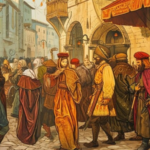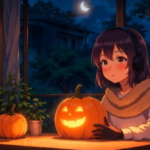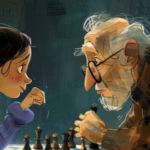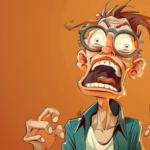Have you ever come across a puzzle that makes you pause, think, and then smile when the answer finally clicks? That is the magic of language riddles. Unlike number puzzles or logic games, language riddles play with words, sounds, meanings, and context. They challenge your brain while keeping things fun and engaging. Whether you are a kid or an adult, language riddles have a unique way of sharpening your mind, improving your vocabulary, and giving your brain a delightful workout.
Language riddles are not just trivial fun. They are an intellectual exercise disguised as entertainment. They stimulate creativity, improve problem-solving abilities, and even help with cognitive flexibility. When you solve a language riddle, you are training your brain to think differently, to spot patterns, and to make connections that might not be obvious at first glance.

250+ “Language Riddles” with Answers
Wordplay Wonders
- Riddle: What has keys but can’t open locks?
Answer: A piano. - Riddle: I’m tall when I’m young, and short when I’m old. What am I?
Answer: A candle. - Riddle: What has hands but cannot clap?
Answer: A clock. - Riddle: The more you take from me, the bigger I get. What am I?
Answer: A hole. - Riddle: What has a head, a tail, is brown, and has no legs?
Answer: A penny. - Riddle: I speak without a mouth and hear without ears. What am I?
Answer: An echo. - Riddle: What comes once in a minute, twice in a moment, but never in a thousand years?
Answer: The letter M. - Riddle: What has cities, but no houses; forests, but no trees; and rivers, but no water?
Answer: A map. - Riddle: I’m found in socks, scarves, and mittens; and often in the paws of playful kittens. What am I?
Answer: Yarn. - Riddle: What has many teeth but cannot bite?
Answer: A comb.
Palindromes
- Riddle: What word reads the same forward and backward and is a type of vehicle?
Answer: Racecar. - Riddle: I am a word for a level of measurement, and I’m the same backward. What am I?
Answer: Tenet. - Riddle: I am a common greeting, spelled the same backward. What am I?
Answer: Noon. - Riddle: I am a small aquatic animal and a palindrome. What am I?
Answer: Pup. - Riddle: Forward or backward, I’m a type of civic division. What am I?
Answer: Civic. - Riddle: I am an eye part and a palindrome. What am I?
Answer: Eye. - Riddle: I am a palindrome and a male name. What am I?
Answer: Bob. - Riddle: I’m a palindrome that’s a vehicle used on tracks. What am I?
Answer: Level. - Riddle: I am a palindrome referring to a reflection in water. What am I?
Answer: Otto. - Riddle: I’m a palindrome and a common exclamation of surprise. What am I?
Answer: Wow.
Anagrams
- Riddle: Rearrange the letters in “listen” to find what you need to do to music.
Answer: Silent. - Riddle: Rearrange “evil” to find something you oppose.
Answer: Live. - Riddle: What do you get if you scramble “save”?
Answer: Vase. - Riddle: Unscramble “stare” to find something you do with your eyes.
Answer: Rates. - Riddle: An anagram of “angel” gives you what kind of being?
Answer: Angle. - Riddle: Rearrange “finder” to find someone who discovers things.
Answer: Friend. - Riddle: What word is an anagram of “cinema”?
Answer: Iceman. - Riddle: Swap letters in “dusty” to find something clean.
Answer: Study. - Riddle: Rearrange “save” to find a decorative container.
Answer: Vase. - Riddle: What word can you make from “brag”?
Answer: Grab.
Synonyms & Antonyms
- Riddle: What is a synonym for “happy” that starts with J?
Answer: Joyful. - Riddle: What is the antonym of “ancient”?
Answer: Modern. - Riddle: Find a synonym for “quick” that rhymes with “stick.”
Answer: Slick. - Riddle: What is an antonym for “scarce”?
Answer: Abundant. - Riddle: Synonym for “angry” that starts with F?
Answer: Furious. - Riddle: Antonym for “fragile”?
Answer: Strong. - Riddle: Find a synonym for “tiny.”
Answer: Small. - Riddle: Antonym for “difficult”?
Answer: Easy. - Riddle: Synonym for “beautiful” that starts with G?
Answer: Gorgeous. - Riddle: Antonym for “generous”?
Answer: Stingy.
Homophones
- Riddle: What sounds like “flower” but is something you can wear?
Answer: Flour. - Riddle: I sound like “sea” but I’m dry. What am I?
Answer: See. - Riddle: What word sounds like “knight” but is part of a clock?
Answer: Night. - Riddle: Sounds like “pair” but refers to a fruit.
Answer: Pear. - Riddle: I sound like “to” and “too” but mean direction.
Answer: Two. - Riddle: Sounds like “sun” but I’m in the sky at night.
Answer: Son. - Riddle: I sound like “meet” but mean oppose.
Answer: Meat. - Riddle: Sounds like “buy” but means exist.
Answer: By. - Riddle: I sound like “road” but can be eaten.
Answer: Rode. - Riddle: Sounds like “see” but you use it to say yes.
Answer: Sea.
Idioms & Sayings
- Riddle: What idiom means “to start over”?
Answer: Back to square one. - Riddle: Meaning of “break the ice”?
Answer: To start a conversation. - Riddle: Which saying means “it’s obvious”?
Answer: The writing’s on the wall. - Riddle: Idiom for “to waste time”?
Answer: Beat around the bush. - Riddle: Meaning of “hit the sack”?
Answer: Go to sleep. - Riddle: Which idiom means “make someone very angry”?
Answer: Blow a fuse. - Riddle: Meaning of “piece of cake”?
Answer: Very easy. - Riddle: Saying for “very close”?
Answer: By a hair. - Riddle: Idiom meaning “risk everything”?
Answer: Throw caution to the wind. - Riddle: Meaning of “spill the beans”?
Answer: Reveal a secret.
Alphabet Puzzles
- Riddle: What comes after B but before D?
Answer: C. - Riddle: Which letter is shaped like a triangle?
Answer: A. - Riddle: I’m the first vowel. What am I?
Answer: A. - Riddle: Letter that looks like a circle?
Answer: O. - Riddle: What comes between M and O?
Answer: N. - Riddle: Last letter of the alphabet?
Answer: Z. - Riddle: Letter that can be used as a Roman numeral for 5?
Answer: V. - Riddle: Which letter sounds like “you”?
Answer: U. - Riddle: First consonant in the alphabet?
Answer: B. - Riddle: Letter shaped like a line?
Answer: I.
Spelling Challenges
- Riddle: Which word is spelled incorrectly in every dictionary?
Answer: Incorrectly. - Riddle: Spell the word for frozen water.
Answer: Ice. - Riddle: How do you spell the opposite of “win”?
Answer: Lose. - Riddle: Spell the word for a young cat.
Answer: Kitten. - Riddle: How do you spell the word that sounds like “reed” but grows in water?
Answer: Reed. - Riddle: Spell the word that rhymes with “night” and you do before sleep.
Answer: Light. - Riddle: Spell the word for a color between black and white.
Answer: Gray. - Riddle: How do you spell the word that means “quickly moving”?
Answer: Fast. - Riddle: Spell the word for a round fruit, often red.
Answer: Apple. - Riddle: How do you spell the word that describes “a place to live”?
Answer: Home.
Word Ladders
- Riddle: Change “cold” to “warm” by changing one letter at a time. Start with C.
Answer: Cold → Cord → Word → Ward → Warm. - Riddle: Change “cat” to “dog” in steps.
Answer: Cat → Cot → Dot → Dog. - Riddle: Turn “hit” into “run” by changing one letter at a time.
Answer: Hit → Hut → Rut → Run. - Riddle: Transform “sun” to “fun.”
Answer: Sun → Fun. - Riddle: Change “top” to “tip.”
Answer: Top → Tip. - Riddle: Turn “bat” into “bag.”
Answer: Bat → Bag. - Riddle: Change “map” to “man.”
Answer: Map → Man. - Riddle: Turn “pen” into “pan.”
Answer: Pen → Pan. - Riddle: Change “run” to “ran.”
Answer: Run → Ran. - Riddle: Turn “hop” into “hot.”
Answer: Hop → Hot.
Foreign Language Fun
- Riddle: In Spanish, I am “agua.” What am I in English?
Answer: Water. - Riddle: In French, I am “chat.” What am I in English?
Answer: Cat. - Riddle: In German, I am “Haus.” What am I in English?
Answer: House. - Riddle: In Italian, I am “rosso.” What am I in English?
Answer: Red. - Riddle: In Japanese, I am “neko.” What am I in English?
Answer: Cat. - Riddle: In Spanish, I am “libro.” What am I in English?
Answer: Book. - Riddle: In French, I am “pain.” What am I in English?
Answer: Bread. - Riddle: In German, I am “baum.” What am I in English?
Answer: Tree. - Riddle: In Italian, I am “acqua.” What am I in English?
Answer: Water. - Riddle: In Japanese, I am “mizu.” What am I in English?
Answer: Water.
Compound Words
- Riddle: I am a word made from “snow” and “man.” What am I?
Answer: Snowman. - Riddle: Combine “butter” and “fly.” What word do you get?
Answer: Butterfly. - Riddle: What compound word comes from “sun” and “flower”?
Answer: Sunflower. - Riddle: Join “book” and “store.” What is the word?
Answer: Bookstore. - Riddle: Combine “tooth” and “brush.”
Answer: Toothbrush. - Riddle: Merge “rain” and “coat.”
Answer: Raincoat. - Riddle: What word is made from “moon” and “light”?
Answer: Moonlight. - Riddle: Join “foot” and “ball.”
Answer: Football. - Riddle: Combine “cup” and “cake.”
Answer: Cupcake. - Riddle: Merge “star” and “fish.”
Answer: Starfish.
Prefixes & Suffixes
- Riddle: Add a prefix to “happy” to make it the opposite.
Answer: Unhappy. - Riddle: Add “-ness” to “kind” to make a noun.
Answer: Kindness. - Riddle: Add a prefix to “possible” to mean not possible.
Answer: Impossible. - Riddle: Add “-ful” to “help” to describe someone generous.
Answer: Helpful. - Riddle: Add a prefix to “place” to mean “not in place.”
Answer: Misplace. - Riddle: Add “-ly” to “quick” to describe how something is done.
Answer: Quickly. - Riddle: Add a prefix to “known” to make it the opposite.
Answer: Unknown. - Riddle: Add “-er” to “teach” to describe a person.
Answer: Teacher. - Riddle: Add “-less” to “hope” to describe lacking it.
Answer: Hopeless. - Riddle: Add a prefix to “do” to mean “not do.”
Answer: Undo.
Rebus Puzzles
- Riddle: What phrase is represented by “C D E F”?
Answer: See the F. - Riddle: What phrase is shown as “W1N”?
Answer: One in a million. - Riddle: What does “H2O” represent?
Answer: Water. - Riddle: “R + E + L + AX” represents what?
Answer: Relax. - Riddle: What is shown by “I M P O T”?
Answer: I’m pot. - Riddle: What phrase is “G R8”?
Answer: Great. - Riddle: What does “B4N” mean?
Answer: Before noon. - Riddle: “F1sh” represents what?
Answer: Fish. - Riddle: What phrase is “2B or not 2B”?
Answer: To be or not to be. - Riddle: “C U L8R” stands for what?
Answer: See you later.
Consonant Games
- Riddle: Remove vowels from “apple.” What is left?
Answer: Ppl. - Riddle: Remove vowels from “orange.”
Answer: Rng. - Riddle: What remains if you remove vowels from “banana”?
Answer: Bnn. - Riddle: Remove vowels from “grape.”
Answer: Grp. - Riddle: Take vowels out of “melon.”
Answer: Mln. - Riddle: Remove vowels from “cherry.”
Answer: Chrry. - Riddle: Take vowels out of “peach.”
Answer: Pch. - Riddle: Remove vowels from “kiwi.”
Answer: Kw. - Riddle: Take vowels out of “plum.”
Answer: Plm. - Riddle: Remove vowels from “pear.”
Answer: Pr.
Rhyming Riddles
- Riddle: What rhymes with “cat” and is a type of hat?
Answer: Hat. - Riddle: Rhymes with “light” and you use it at night.
Answer: Night. - Riddle: Rhymes with “sun” and flies in the sky.
Answer: Fun. - Riddle: Rhymes with “rain” and is a color.
Answer: Cane. - Riddle: Rhymes with “mouse” and lives in a house.
Answer: House. - Riddle: Rhymes with “ball” and you might bounce it.
Answer: Tall. - Riddle: Rhymes with “tree” and is something you see in the sea.
Answer: Sea. - Riddle: Rhymes with “blue” and is something you do.
Answer: Do. - Riddle: Rhymes with “cake” and is something you bake.
Answer: Bake. - Riddle: Rhymes with “pen” and is a type of animal.
Answer: Hen.
Letter Substitution
- Riddle: If A=1, B=2, C=3, what does 3 1 20 spell?
Answer: CAT. - Riddle: If A=1, B=2, C=3, what does 4 15 7 spell?
Answer: DOG. - Riddle: Using the same code, what is 20 15 16?
Answer: TOP. - Riddle: 16 5 14 spells what?
Answer: PEN. - Riddle: 2 15 15 11 represents which word?
Answer: BOOK. - Riddle: 18 1 20 spells what?
Answer: RAT. - Riddle: 19 21 14 spells what?
Answer: SUN. - Riddle: 6 21 14 represents what word?
Answer: FUN. - Riddle: 7 18 1 25 spells what?
Answer: GRAY. - Riddle: 8 1 20 spells what?
Answer: HAT.
Hidden Words
- Riddle: I am hidden in “caterpillar,” and I am a type of pet. What am I?
Answer: Cat. - Riddle: I am hidden in “sunflower,” and I am something you drink. What am I?
Answer: Tea. - Riddle: I am hidden in “grandmother,” and I am a type of animal. What am I?
Answer: Ram. - Riddle: I am hidden in “pineapple,” and I am a part of the body. What am I?
Answer: Arm. - Riddle: I am hidden in “friendship,” and I am a vehicle. What am I?
Answer: Ship. - Riddle: I am hidden in “handwriting,” and I am a part of your hand. What am I?
Answer: Ring. - Riddle: I am hidden in “strawberry,” and I am something you can wear. What am I?
Answer: Straw. - Riddle: I am hidden in “blackboard,” and I am a type of board game. What am I?
Answer: Ludo. - Riddle: I am hidden in “butterfly,” and I am an insect. What am I?
Answer: Fly. - Riddle: I am hidden in “backpack,” and I am an item you use to write. What am I?
Answer: Pen.
Word Origins / Etymology
- Riddle: The word “salary” comes from the Latin word for what?
Answer: Salt. - Riddle: “Alphabet” comes from which two letters of the Greek alphabet?
Answer: Alpha and Beta. - Riddle: The word “robot” comes from which language meaning “forced labor”?
Answer: Czech. - Riddle: “Nightmare” originally referred to a mythical creature. What was it?
Answer: A goblin that sat on your chest. - Riddle: “Clue” comes from “clew,” meaning what?
Answer: A ball of thread. - Riddle: The word “museum” comes from the Greek word for what?
Answer: A place of the Muses. - Riddle: “Panic” originates from the Greek god Pan. What was he associated with?
Answer: Fear. - Riddle: “Candidate” comes from the Latin “candidatus.” What does it mean?
Answer: Dressed in white. - Riddle: “Hobby” originally referred to what animal?
Answer: A small horse. - Riddle: “Quarantine” comes from Italian “quaranta giorni.” How many days?
Answer: Forty.
Palindromic Phrases
- Riddle: I am a phrase that reads the same backward: “A man, a ___, a plan, a canal, Panama.” What am I?
Answer: Canal. - Riddle: I am a short palindromic phrase meaning “never odd or even.” What am I?
Answer: Never odd or even. - Riddle: Palindrome for the phrase “Was it a car or a ___ I saw?” What am I?
Answer: Cat. - Riddle: “Madam, in Eden, I’m ___.” Complete the palindrome.
Answer: Adam. - Riddle: “Yo, Banana Boy” is what type of phrase?
Answer: Palindrome. - Riddle: “Eva, can I see ___ in a cave?” Complete it.
Answer: Bees. - Riddle: Palindrome phrase meaning “step on no pets.” What am I?
Answer: Step on no pets. - Riddle: “Do geese see ___?” Fill the palindrome.
Answer: God. - Riddle: “No lemon, no ___, no melon.” Complete the palindrome.
Answer: Melon. - Riddle: “Was it a ___ I saw?” Fill in the palindrome.
Answer: Rat.
Word Associations
- Riddle: I am associated with “bread.” What goes with me?
Answer: Butter. - Riddle: I am associated with “pen.” What goes with me?
Answer: Paper. - Riddle: I am linked to “sun.” What naturally goes with me?
Answer: Shine. - Riddle: I am connected to “book.” What goes with me?
Answer: Reading. - Riddle: I am associated with “school.” What goes with me?
Answer: Teacher. - Riddle: I am connected to “coffee.” What goes with me?
Answer: Mug. - Riddle: I am associated with “music.” What goes with me?
Answer: Song. - Riddle: I am linked to “car.” What goes with me?
Answer: Wheel. - Riddle: I am associated with “moon.” What goes with me?
Answer: Night. - Riddle: I am connected to “river.” What goes with me?
Answer: Water.
Cryptic Clues
- Riddle: Cryptic: “Feline sound initially” (3 letters). What am I?
Answer: Cat. - Riddle: “Opposite of yes, cut short” (2 letters). What am I?
Answer: No. - Riddle: “Backward saw” (3 letters). What am I?
Answer: Was. - Riddle: “A male, strangely” (3 letters). What am I?
Answer: Man. - Riddle: “Silent letter in ‘knight’” (1 letter). What am I?
Answer: K. - Riddle: “Part of a tree, initially tall” (1 letter). What am I?
Answer: T. - Riddle: “Prefix meaning not” (2 letters). What am I?
Answer: Un. - Riddle: “Found in ‘listen’, secretly” (1 letter). What am I?
Answer: I. - Riddle: “Backward pot” (3 letters). What am I?
Answer: Top. - Riddle: “First vowel of ‘apple’” (1 letter). What am I?
Answer: A.
Backwards Words
- Riddle: Spell “dog” backward. What am I?
Answer: God. - Riddle: Spell “stop” backward.
Answer: Pots. - Riddle: Spell “star” backward.
Answer: Rats. - Riddle: Spell “live” backward.
Answer: Evil. - Riddle: Spell “drawer” backward.
Answer: Reward. - Riddle: Spell “desserts” backward.
Answer: Stressed. - Riddle: Spell “evil” backward.
Answer: Live. - Riddle: Spell “ton” backward.
Answer: Not. - Riddle: Spell “gateman” backward.
Answer: Nametag. - Riddle: Spell “loop” backward.
Answer: Pool.
Word Chains
- Riddle: Change “cat” to “dog” in steps of one letter.
Answer: Cat → Cot → Dot → Dog. - Riddle: Change “hit” to “run.”
Answer: Hit → Hut → Rut → Run. - Riddle: Change “man” to “sun.”
Answer: Man → Fan → Fun → Sun. - Riddle: Change “top” to “tip.”
Answer: Top → Tap → Tip. - Riddle: Change “bat” to “bag.”
Answer: Bat → Bag. - Riddle: Change “pen” to “pan.”
Answer: Pen → Pan. - Riddle: Change “hop” to “hot.”
Answer: Hop → Hot. - Riddle: Change “run” to “ran.”
Answer: Run → Ran. - Riddle: Change “map” to “man.”
Answer: Map → Man. - Riddle: Change “log” to “dog.”
Answer: Log → Dog.
Spoonerisms
- Riddle: Swap sounds: “Fighting a liar.” What is it?
Answer: Lighting a fire. - Riddle: Swap sounds: “Tease my ears.”
Answer: Ease my tears. - Riddle: Swap sounds: “Silly goose.”
Answer: Gilly soose. - Riddle: Swap sounds: “Crushing blows.”
Answer: Blushing crows. - Riddle: Swap sounds: “Belly jeans.”
Answer: Jelly beans. - Riddle: Swap sounds: “Right me wrong.”
Answer: Write me wrong. - Riddle: Swap sounds: “Pour the sun.”
Answer: Sour the pun. - Riddle: Swap sounds: “Nasty fables.”
Answer: Fasty nables. - Riddle: Swap sounds: “Go kiss me.”
Answer: Know miss gee. - Riddle: Swap sounds: “Moon beam.”
Answer: Boon meam.
Letter Frequency Puzzles
- Riddle: What is the most common letter in English?
Answer: E. - Riddle: What is the least common letter in English?
Answer: Z. - Riddle: Which letter starts most English words?
Answer: S. - Riddle: Which letter appears most in “alphabet”?
Answer: A. - Riddle: Which vowel is most frequent in English?
Answer: E. - Riddle: Which consonant appears most often in “frequency”?
Answer: R. - Riddle: Which letter appears rarely at the beginning of words?
Answer: X. - Riddle: Which letter is most common at the end of English words?
Answer: E. - Riddle: Which letter is common in both “language” and “letters”?
Answer: L. - Riddle: Which letter is most frequent in “communication”?
Answer: C.
What Are Language Riddles?
Language riddles are puzzles that rely on the intricacies of language for their solution. They can involve wordplay, puns, homonyms, homophones, metaphors, or even tricky phrasing. Unlike traditional riddles that might focus on logic or math, language riddles require an understanding of words and their multiple meanings. For example, a classic riddle might ask, “What has keys but cannot open locks?” and the answer is “a piano.” The answer is clever because it plays with the multiple meanings of the word “keys.”
Why People Love Language Riddles
The appeal of language riddles is universal. People enjoy them because they are engaging, challenging, and often humorous. They spark curiosity, and solving a riddle gives a satisfying sense of achievement. Language riddles are like mini-brain adventures where words are the treasures waiting to be discovered. They can entertain, educate, and even create memorable moments when shared among friends or family.
The History of Language Riddles
- Ancient Roots of Word Puzzles
Language riddles are not a modern invention. They have existed for thousands of years. Ancient civilizations used riddles as a tool for storytelling, teaching, and entertainment. In Greece, riddles were often part of literature and philosophy, used to challenge the wisdom of thinkers. The famous Sphinx riddle in Greek mythology is an excellent example. Ancient Egypt also used riddles as part of educational games to teach young scribes.
- Language Riddles in Different Cultures
Every culture has its own unique form of language riddles. In England, medieval literature is filled with clever word puzzles. In Japan, there are traditional kotozukai riddles that focus on sounds and wordplay. African folklore often features riddles as a way of passing down wisdom and morals. Exploring language riddles from different cultures can teach us about the diversity of human thought and the universal love for wordplay.
Types of Language Riddles
- Classic Wordplay Riddles
Classic wordplay riddles twist meanings, spellings, or structures of words to trick the reader. These riddles may require you to think about synonyms, antonyms, or hidden meanings. For example, a riddle might ask, “I speak without a mouth and hear without ears. What am I?” The answer is “an echo.” Wordplay riddles like this force you to interpret words in a non-literal way.
- Homophones and Homonyms
Some language riddles rely on words that sound alike but have different meanings, known as homophones. Others use homonyms, words that are spelled the same but have multiple meanings. For instance, consider the riddle, “What can run but never walks?” The answer is “a river.” Understanding these subtleties is key to solving many language riddles.
- Puns and Double Meanings
Puns are a favorite tool in language riddles. They exploit words that have more than one meaning or words that sound similar but are different. A riddle might say, “Why did the scarecrow win an award?” The answer is “because he was outstanding in his field.” Puns make language riddles funny, clever, and memorable.
- Cryptic and Enigmatic Riddles
Cryptic riddles are among the most challenging types of language riddles. They often involve metaphorical language, hidden meanings, or subtle clues. Solving cryptic riddles requires attention to detail, patience, and creative thinking. For example, a riddle might read, “The more you take from me, the bigger I get. What am I?” The answer is “a hole.” These riddles are designed to make you think outside conventional interpretations.
Benefits of Solving Language Riddles
- Boosting Cognitive Skills
Solving language riddles is like a mental workout. It improves focus, memory, attention to detail, and analytical thinking. The brain has to process multiple meanings and relationships between words, strengthening cognitive pathways and mental agility.
- Enhancing Vocabulary and Language Skills
Language riddles are excellent for expanding your vocabulary. They expose you to new words, unusual phrases, and creative uses of language. Over time, solving riddles improves your reading comprehension, writing skills, and overall language proficiency.
- Improving Problem-Solving Abilities
Riddles require both logic and creativity. You have to analyze, evaluate, and experiment with possible answers. This process enhances problem-solving abilities and teaches flexible thinking, skills that are valuable in both personal and professional life.
Tips and Tricks to Solve Language Riddles
- Look for Wordplay
Always look for subtle tricks and wordplay. A riddle may lead you in one direction, but the answer is hiding in a double meaning, a pun, or a homophone.
- Break Down the Words
Sometimes solving a riddle requires breaking down words into prefixes, suffixes, or individual letters. Consider acronyms or hidden meanings that may not be immediately obvious.
- Think Outside the Box
Many language riddles rely on creative thinking. Don’t just rely on literal interpretations. Ask yourself, what else could this phrase or word imply? Often, the answer lies beyond the obvious.
Common Mistakes People Make
- Overthinking Simple Riddles
One common mistake is overcomplicating a simple riddle. Sometimes the answer is straightforward and requires only common sense or a different perspective.
- Ignoring Multiple Meanings
Ignoring the multiple meanings of words is another common pitfall. Many language riddles hinge on words having more than one interpretation. Being open to alternative meanings is key.
Famous Language Riddles You Must Try
- Riddles That Stump Even Experts
Some riddles are legendary for their difficulty. For example, “I have cities but no houses, forests but no trees, and rivers but no water. What am I?” The answer is “a map.” These riddles challenge even experienced solvers and are perfect for testing your skills.
- Fun Riddles for Kids and Adults
Language riddles can be adapted for all ages. Simple riddles like “What has keys but cannot open locks?” are great for children. More complex riddles are perfect for adults who enjoy a challenge. Sharing riddles is also a social activity, creating laughter and connection.
Creating Your Own Language Riddles
- Steps to Make Engaging Riddles
To create your own riddle, start with a word or phrase. Think about multiple meanings, puns, and alternative interpretations. Test your riddle on friends to see if it is challenging yet solvable. A well-crafted riddle entertains and teaches at the same time.
- Avoiding Overly Complicated Puzzles
A riddle should challenge the mind but not frustrate it. Avoid overly convoluted language or obscure references. The best riddles are clever, fair, and fun to solve.
Language Riddles in Modern Entertainment
- Apps and Online Platforms
Language riddles have found a strong presence in digital media. Mobile apps, online puzzle communities, and social media platforms allow people to solve riddles anytime, anywhere. Many apps even personalize riddles based on skill level.
- TV Shows and Games That Feature Word Riddles
Game shows, escape rooms, and puzzle competitions often include language riddles. They make the experience interactive, exciting, and competitive, turning wordplay into a thrilling challenge.
How Teachers Use Language Riddles in Education
- Making Learning Fun
Educators use riddles to turn mundane lessons into engaging challenges. Language riddles help students learn new words, develop critical thinking, and participate actively in class activities.
- Exercises to Improve Critical Thinking
Riddles encourage students to think creatively and analyze problems from multiple angles. They help improve reasoning skills and make learning both interactive and enjoyable.
Psychological Aspects of Solving Riddles
- Why Our Brains Enjoy Puzzles
Solving riddles triggers the release of dopamine, creating a sense of pleasure and satisfaction. The brain enjoys the challenge, and the reward reinforces problem-solving behavior.
- Language Riddles and Stress Relief
Focusing on a riddle can be a calming activity. It diverts attention from stressors, engages the mind positively, and provides mental relaxation while exercising the brain.
Language Riddles Around the World
- British and American Riddles
English-speaking countries are famous for puns, rhymes, and clever wordplay. Classic nursery rhymes and witty brainteasers continue to entertain people of all ages.
- Asian and European Word Games
Asian countries like Japan have intricate wordplay riddles, while European nations use rhymes and metaphors in language puzzles. Exploring riddles globally enhances cultural understanding and linguistic skills.
Common Misconceptions About Language Riddles
- They Are Only for Kids
Many assume riddles are childish, but adults can enjoy them just as much. Complex riddles can challenge and stimulate adult brains while providing entertainment.
- They Are Just Entertainment
Riddles are fun, but they also enhance memory, language, creativity, and reasoning skills. They are educational tools disguised as playful puzzles.
Future of Language Riddles
- AI and Digital Riddles
Artificial intelligence is revolutionizing riddles. AI can create complex riddles, adapt challenges to individual skill levels, and even simulate interactive riddles in virtual reality.
- Keeping Language Riddles Alive
Despite technological changes, the charm of traditional language riddles remains. Sharing riddles with family, friends, and students ensures they continue to inspire curiosity and creativity.
Conclusion
We hope you enjoyed exploring these 250+ fun and clever language riddles with answers! Whether you’re testing your own skills or sharing them with friends and family, riddles are a fantastic way to challenge your brain and have a laugh at the same time. If you’re craving even more witty puzzles, don’t miss our collection of 250+ Best Hilarious “Country Riddles” with Answers here for another round of entertaining mind games. Keep puzzling, keep laughing, and let your curiosity lead the way!
FAQs
Q. What makes a language riddle effective?
An effective language riddle is clever, fair, and challenges the solver to think creatively while using wordplay or multiple meanings.
Q. Can language riddles improve brain function?
Yes, solving language riddles boosts memory, cognitive skills, problem-solving abilities, and mental agility.
Q. Are language riddles suitable for children?
Absolutely. Riddles can enhance vocabulary, critical thinking, and reading skills while providing fun learning experiences.
Q. How can I create my own language riddles?
Start with a word or phrase, explore puns and multiple meanings, and test your riddle to ensure it is challenging yet solvable.
Q. Why do language riddles feel satisfying to solve?
Solving a riddle releases dopamine in the brain, creating a sense of reward, excitement, and accomplishment.










